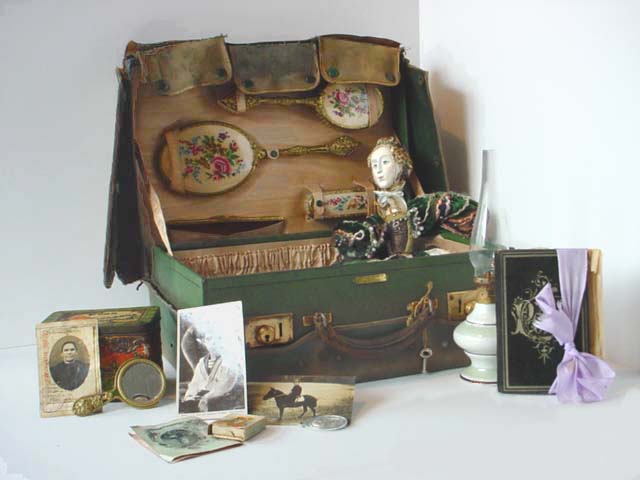|
|
 Inv.SAH/to-59200 Inv.SAH/to-59200
The Russian Princess
(A fairytale for Fay)
Item acquired by the
Collector on 7 April1991
Origin: Bruges, Belgium
Description
Russian doll (ca 1897), poetry notebook and miscellaneous children's souvenirs
in a green Barber case.

Report
Contents of the poetry notebook
Sometimes toys capture the dreams and hopes of the children who
treasured them for so many years. When we grow up, the soul of our youth
remains frozen in time in our toys,
preventing them from disappearing for good. Toys can end up becoming the most
powerful of magical instruments because they hold emotion in its purest
form, unaltered by years of social convention.
Later in life, it may be possible to re-awaken these entities, to bring them back
to life - but doing so can be a risky proposition.
Let yourself be swept away by this fairytale written in July 1943.
The sound of boots marching in goosestep kept more than one
inhabitant of Brussels from getting a good night's sleep; the threat of
further bombardments loomed over the occupied capital.
Marie finally decided to tidy up a corner of the cellar so that she
could take in other
guests, or use as a shelter in case of an air raid. Nearly gagging
on the strong, musty odour, she pressed a handkerchief doused in essence
of violet to her mouth. Cleaning and rearranging the
cellar would take some time.
An odd group of useless objects was her first target.
But then she spied the case, partly covered in a layer of slick mildew that had grown between the leather and the cotton lining. Strangely
enough, neither the interior of the object nor its contents had suffered.
It was an excellent green Barber case from Bradford, an old communion
gift whose exceptionally high quality was capable of warding off the
ravages of time.
Opening it, she was overcome with images of her
childhood; soon she was trying to fight off the tears.
The case contained a superb Russian doll with a delicate porcelain face,
a blank poetry notebook, a set of unused miniature cards and an old tea box filled with souvenirs picked up here
and there, or brought back by her parents from their many trips.
A nightmare that had never stopped haunting her surfaced in her conscious
mind.
Marie remembered the time when she was a young girl, and decided to
recount the story of her youth to Fay, her daughter.
She opened her poetry notebook, dipped her pen in the deep blue ink
and started to write a fairytale;
a story of vengeance and a strange curse for which she had always felt
responsible.
A fairytale for Fay must always begin with the four magic words: Once upon
a time...
there was a small girl with hair the colour of golden flax. She was as
pretty as the night of a full moon, had magnificent grey-blue eyes and
answered to the lovely name of Marie. She was born in a faraway country
called Russia on 12 August 1904 (although according to the Russian
calendar used at that time it was 31 July).
Her father, a Belgian geologist, spent his
time prospecting in foreign countries. His wife accompanied him on his
travels.
Now, all of this would be perfectly ordinary if she
hadn't been born at the exact same moment as a small prince named Alexis Nikolayevich.
The angels must have smiled twice that day.
During their stay in Russia, the young girl's parents were invited to
the emperor's court and Marie quite naturally struck up a friendship
with the young prince. As children are sometimes wont to do, they swore
an oath that they would stay together forever.
On their shared sixth birthday, the young girl received a magnificent
old doll of a Russian princess from Anastasia, one of her
friend's sisters. Perhaps she too would become a princess one day.
But a dark shadow loomed over the story, for the young prince was
gravely ill.
In desperation, his mother gradually isolated him from everyone
else in order to protect him. The slightest injury could kill him, empty
him of his blood. His fits sometimes caused him intolerable pain.
As is the case with fairytales, when the young prince fell ill, the
country was plunged into sorrow.
No doctor was able to cure Alexis.
That was when the magician appeared.
A monk, visionary, conjurer and shepherd of souls - he had the knowledge
and power needed to ease the young prince's pain and suffering. He was
ushered into the palace like a soul snatcher.
Marie only met him once, at Madame Vuiborova's home.
He reeked of alcohol and garlic. Placing his hand on the dollhe ,
looked at the young girl and said one word and one word only: "Alexis".
A feeling of terror welled up from the depth's of Marie's soul,
paralysing her.
Unfortunately, all cures have side effects, and the monk's grip
widened to include the imperial family.
Soon the emperor was a mere shadow of the man he used to be, and the
empress withdrew even further from reality.
The young girl no longer saw her friend. But she communicated with her
doll, who became her sole companion; her little prince only came to her
in her dreams.
Then the troubles began. A war erupted in Europe; demonstrations were
organised against the emperor. Marie's parents sent
her back to Belgium to stay with a host family.
Now more isolated than ever, she withdrew into her own world, opening
up her heart to no one else but her doll, which had become her closest
confidante. But now it seemed that, more and more, the doll was talking
back to her.
She was a model pupil and earned excellent marks at school, imagining that
they were messages from her prince charming. You see, the special stars
for good work she
received at school had Christian maxims written on them.
The first question she put to the doll was this:
"Are you engulfed in war?"
She read the answer on the star: "Blessed are the meek, for they
shall inherit the earth."
Some time later the monk was brutally murdered.
But he had prophesied that six weeks after his death, the young prince
would begin to suffer, and that the imperial family would be condemned.
The reckoning had begun.
Learning of the news, she asked the doll: "Alexis, how do you feel?"
"Earthly suffering has no comparison with the glory of heaven," was the response from the piece of paper.
She did not ask her doll any more questions for more than a year...
Until Tuesday, 16 July 1918 when, after a horrible nightmare, she
asked her final question.
And the maxim read: "Death will come like a thief in the night,
when one is least expecting it."
During the previous night, Czar Nicholas II and his entire family were
murdered by a Jewish Bolshevik called Yakov Yurovsky and his
men at Ipatiev House in Ekaterinburg.
In her anger and grief, the young girl wished for all those
responsible for the hideous crime to be punished as horribly as possible.
She traced out, in reverse, empress Alexandra's favourite magic sign as a symbol of
her vengeance. The last mark which the Czarina had written on
the walls of her prison to protect herself from evil. The sign was a
swastika, which would later go on to become infamous.
The young prince would have his revenge.
Marie, in occupied Brussels, 12 August 1943
Background to the poetry notebook
Marie was born on 12 August 1904 in Saint Petersburg.
In 1943, and now married, she found herself in Nazi-occupied Belgium
and decided to write a memory of her childhood as a gift for her
six-year-old daughter Fay (named
after her grandmother).
She travelled between Belgium, Russia and other countries from 1904
to 1913, accompanying her parents on their many trips.
In 1913, with war looming, her parents sent her to stay with a family
in Liège, Belgium. She stayed there until 1924. Her parents disappeared
in the upheaval.
She withdrew into her childhood dreams and began using her doll for
magic.
This set of items includes a Russian doll from the late 19th century,
a poetry notebook, a pre-revolutionary Russian tea box containing her souvenirs (the stars
from school,
a Russian dance card from the turn of the century, a small doll's blackboard and
other items), and a book on the 1917 revolution (published in 1934).
All of the objects are contained in a superb green case (early 20th
century) specially designed for
young girls.
|
|










